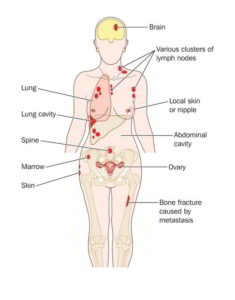Background
Epidermal Growth Factor Receptor, EGFR, mutations are one of the most common driver mutations in Non–Small-Cell Lung Cancer, NSCLC.
Tagrisso, a third-generation EGFR tyrosine kinase inhibitor, TKI, is approved for first-line treatment of patients with advanced NSCLC and EGFR exon 19 deletion or L858R mutations.
In the pivotal FLAURA study, treatment with Tagrisso resulted in a 54% reduction in the risk of disease progression or death as compared with treatment with a first-generation EGFR TKI.
However, the toxicities of rash and diarrhea are strongly associated with inhibition of wild-type EGFR.
There is a need for additional third-generation EGFR inhibitors that both offer effective first-line treatment of EGFR-mutant NSCLC and are well-tolerated.
About the AENEAS Trial
This is a phase III trial of Ameile (Aumolertinib) vs Gefitinib as first-line therapy for locally advanced or Metastatic Non–Small-Cell Lung Cancer with EGFR Exon 19 Deletion or L858R Mutations
Purpose
Ameile is a novel third-generation Epidermal Growth Factor Receptor Tyrosine Kinase Inhibitor approved in China.
This double-blind phase III trial evaluated the efficacy and safety of Ameile compared with Iressa as a first-line treatment for locally advanced or metastatic EGFR-mutated non–small-cell lung cancer
Methods
Patients were randomly assigned to receive either Ameile (110 mg) or Iressa (250 mg) once daily.
The primary end point was Progression-Free Survival, PFS, per investigator assessment.
Results of the AENEAS Trial
A total of 429 patients who were naïve to treatment for locally advanced or metastatic NSCLC were enrolled.
PFS was significantly longer with Ameile compared with Iressa.
The median PFS with Ameile was 19.3 months versus 9.9 months with Iressa.
Objective Response Rate and Disease Control Rate, which the percentage of patients whose disease had stopped growing or decreased in size of tumor, were similar in the Ameile and Iressa groups.
The median Duration of Response was 18.1 months with Ameile versus 8.3 months with Iressa.
Adverse events of high 3 severity were observed in 36.4% and 35.8% of patients in the Ameile and Iressa groups, respectively.
Rash and diarrhea were observed in 23.4% and 16.4% of patients who received Ameile compared with 41.4% and 35.8% of those who received Iressa, respectively.
Conclusion
Ameile is a well-tolerated third-generation epidermal Growth Factor Receptor Tyrosine Kinase Inhibitor that could serve as a treatment option for EGFR-mutant NSCLC in the first-line setting.
Talk to us so see if we can help you to actually get the most advanced treatments
TRIAL•IN Pharma
Because we, do not give up on life!
Contact us 24/7 –
Call center +44.2082.426.039
Read more about Lung cancer >>




















